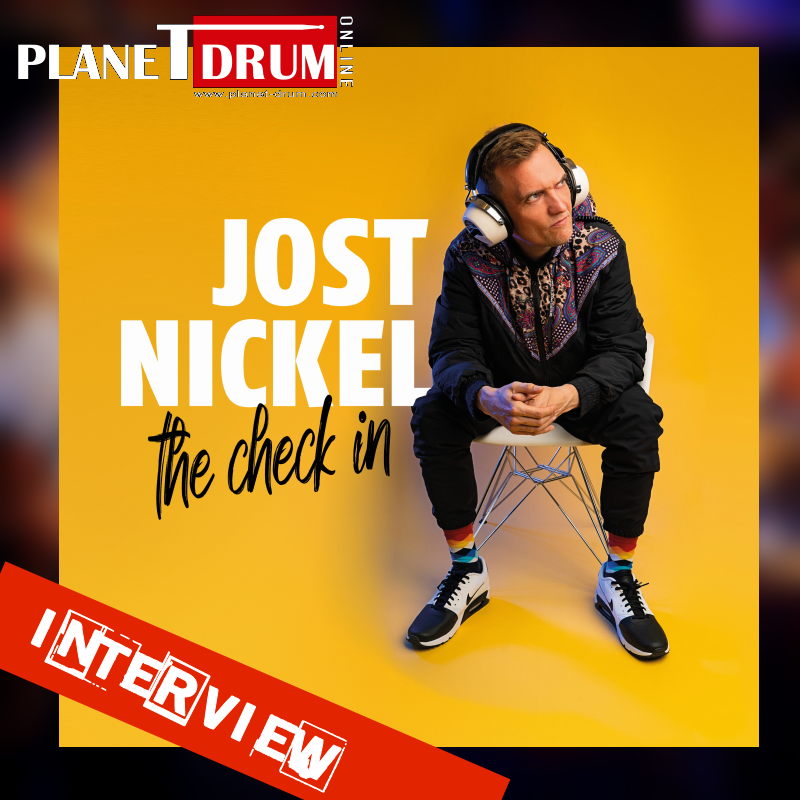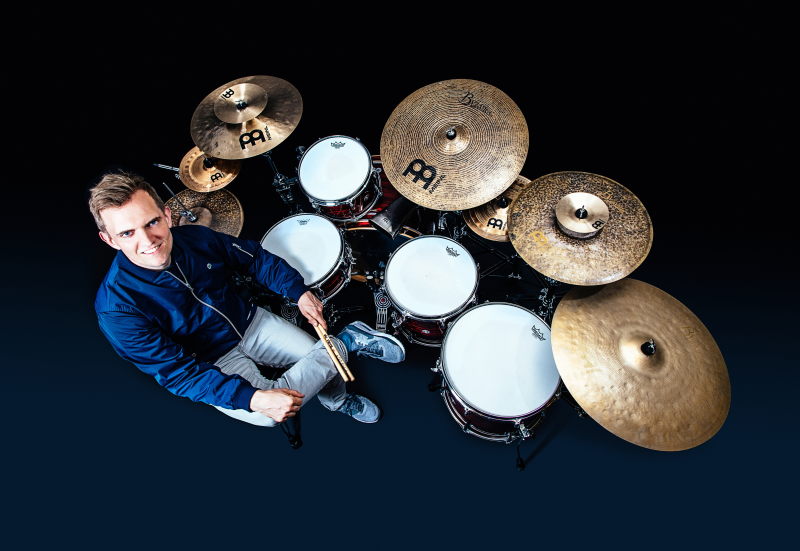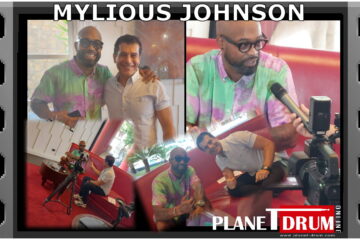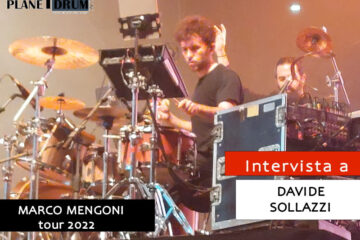
Jost Nickel is one of the very few top German tour & session drummers whose name also enjoys an excellent international reputation. He has worked with many jazz greats such as Barry Finnerty (Miles Davis, The Crusaders), Randy Brecker, Bob Mintzer (Yellowjackets, WDR Big Band), Mitch Forman (John McLaughlin, Wayne Shorter), Jimmy Haslip (Yellowjackets, Allan Holdsworth) and Jeff Lorber live and in the studio.
After years of honored career and excellent collaborations, we had the pleasure of meeting Jost Nickel to let us tell how his first solo album was born and also a little of his story.
Marco Mammoliti – Jost Nickel, first of all welcome to Planet Drum and thank you for your time.
Jost Nickel – My pleasure!
M. M. – Let’s go right to the point! “The Check In” is your debut album after many years of a great career. Why did you wait so long?
J. N. – Good question! I always wanted to record my own album but then I was busy touring and recording. 10 years ago, I knew I wanted to do something on my own and I was thinking either write a drum book or record an album. As you know I decided to write a drum book first which I then called “Jost Nickel’s Groove Book”. After that experience I had so many topics for drum books that I wrote three more. They are called “Fill Book” & “Snare Book” and also a play-along book which is only available in Chinese. In 2018, right after my last book was published I started working on my album “The Check In”.
In general, when you create your own material the first one is always the hardest because you have to overcome so many obstacles. On the one hand there are technical difficulties, like having to learn a new program to write notation or finding a publisher and on the other hand you have to somehow organize the whole process for yourself. No one tells you how to do it….you have to figure out for yourself.
All of that can be frustrating and takes time.
So, that’s why after the first book I wrote more books. I had simply learned the tools to make them, so it wasn’t as much work as the first one.
Also, when you made something on your own and you finished it, it gives you the confidence to continue. Now that I know I can write, record and produce an album, I will soon start working on the next.
M. M. – In this project you have been accompanied by great musicians. Do you want to tell us about the project and how this album is born?
J. N. – When I had the demos for the first songs I started thinking about the musicians I wanted to involve. I then made the decision to only ask players that I had worked with before. So, I asked a lot of my German musician friends who were all into it. I also asked a few of the American Jazz giants I had the pleasure to work with in the past. like Barry Finnerty (git) who played with Miles Davis and Joe Cocker, Grammy-winner Jeff Lorber on keys and bass legend Jimmy Haslip who plays with all the best drummers all the time 🙂
M. M. – You play with an impressive assortment of musicians and styles and you feel very comfortable in both jazz and pop. Technically and artistically talking, how are the different demands of each style and are there differences in how you approach playing such different situations?
J. N. – To me the ultimate challenge always is to play with the right feel. You know, it needs to feel good. That’s the same for every song and every genre.
But you should always be aware of the musical situation you’re in. In pop music the vocabulary you use might be different compared to Jazz. The biggest difference between the two genres is that you get to improvise a lot more in Jazz. And that’s exactly what I love about that. Discover new grounds while you play.
M. M. – You have received many achievements during your career. “Best Clinician” by Modern Drummer Magazine but also other magazines rewarded you in the years (we as Planet Drum will work something out J). What is your proudest achievement in music?
J. N. – When I end up on a list like “best clinicians” I feel very honored but it’s also a bit like: are they really talking about me? I am always more focused on moving ahead, which means that I enjoy these things for a little while and then I move on because I exactly know what I want to improve on or do next. Probably I should learn to be proud of these things but I am afraid that I am just not wired that way.
M. M. – We know that you enjoy the educational aspect. As you told us before, you have released three best-selling books through Alfred Publishing: “Jost Nickel’s GROOVE BOOK” (2015), “Jost Nickel’s FILL BOOK” (2017), and “Jost Nickel’s SNARE BOOK” (2019). Can you explain in what consists your teaching method?
J. N. – The drums are a purely rhythmical instrument. There might be melodic components but we usually don’t play melodies like on a piano. So, when I practice I look at it like this: The rhythmical side always stays the same. There will always be sixteen 16ths notes in a bar of 4/4 time. Always! And then there are certain concepts of how to organize these 16ths notes like odd groupings and so on. Once this is crystal clear you can always use the same rhythmical ideas for the stuff you want to practice.
So, ultimately the rhythmical side stays the same but how you apply this constantly changes. That’s how I practice and that’s also in my books.
M. M. – You are a respected clinician and educator, how do you manage to keep your clinics fresh, how you like to present them to young drummers and what is it that you hope the audience will walk away with?
J. N. – When I play or give clinics I am in a good mood, the energy is up and so it feels fresh! The best that can happen to any audience is that they enjoy your performance. They get carried away. If I manage to do that and inspire my audience to wanting to play more that’s all I can ask for.

M. M. – What was the funniest question has Jost Nickel heard during a clinic?
J. N. – Sometimes you get weird questions where somebody doesn’t really want to ask a question but instead wants to tell you that you’re using the wrong bass drum technique. I normally find this quite funny because it’s an interesting situation. I usually don’t get offended by stuff like this and it rarely happens. Almost all of the people are really friendly and it’s a pleasure to interact with them.
M. M. – Have you ever used virtual instruments to express yourself artistically?
J. N. – I am definitely an acoustic drummer. There are interesting options when you use a digital drum kit that an acoustic drum set doesn’t have. But that goes the other way round, also.
M. M. – What keeps inspiring you to play drums today?
J. N. – I really don’t know. I only know that I still love practicing and that I never seem to run out of ideas. A long time ago, when I was practicing 8 to 10 hours every day, my brother asked me if I wasn’t afraid that one day my will to practice would die. I didn’t really understand the question because I just wanted to do this every day, haha J
M. M. – Future projects?
J. N. – Indeed! I already started writing a new drum book and as I said before I will start working on new songs very soon.
M. M. – One last promise. When you happen to come to Rome you have to come and visit us in our new headquarters and recording studio for a video interview and a few minutes of music together!
J. N. – Deal! I am looking forward to seeing your studio and office!
M. M. – Thanks Jost Nickel for beeing with www.planet-drum.com
J. N. – Thank you for having me!


